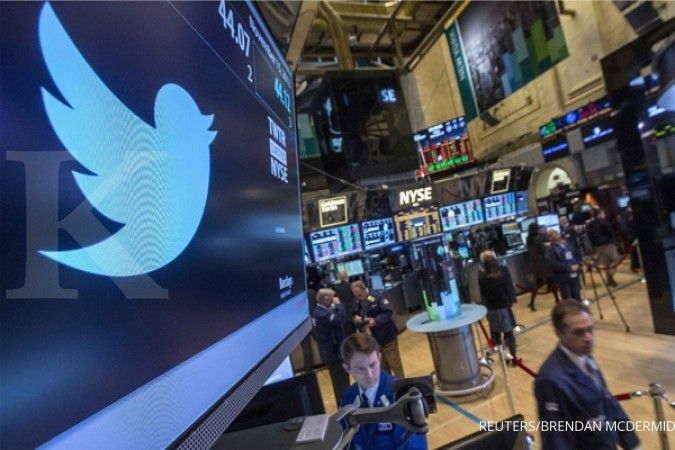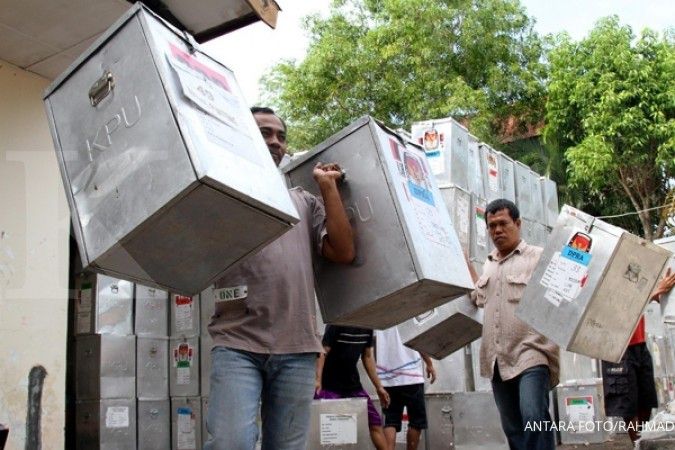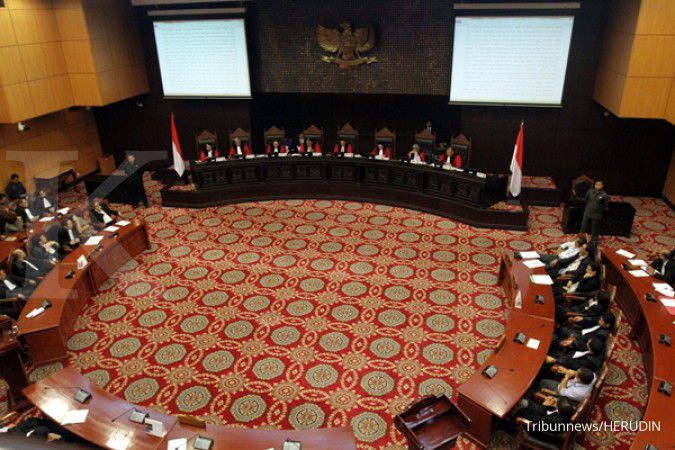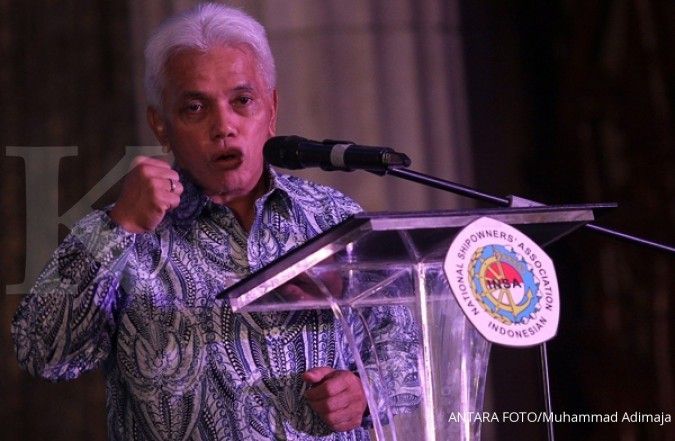JAKARTA. If the voting turmoil in Hong Kong is an indication of the standard of logistical distribution and organization, the General Elections Commission (KPU) may confront serious challenges in tomorrow’s election as voter turnout is projected to be surprisingly high.
The nation has never been so divided since the 1998 reform movement that ended Soeharto’s dictatorship, and citizens have become increasingly enthusiastic about casting their vote in the choice between presidential hopefuls Joko “Jokowi” Widodo and Prabowo Subianto.
The KPU has officially registered 190.2 million voters for the election, up by 2.43 million from the legislative election on April 9, but many eligible voters left off the registration list are expected to come out in droves to polling stations.
While the number of such voters is unknown, analysts have urged the KPU to prepare measures to accommodate the high turnout or risk triggering turmoil.
Election and Democracy Watchdog (Perludem) executive director Veri Junaidi said the KPU should learn from the recent incidents in Hong Kong and in California, in the US, where Indonesian voters were faced with time restrictions and a shortage of ballots.
The problems meant thousands of Indonesians were unable to cast their vote, leading hundreds of migrant workers in Hong Kong to stage a rally protesting what they claimed was the KPU’s mismanagement.
The KPU has permitted unregistered voters to vote if they have their ID, family card, passport or other identification document and go to the polling stations in their residential area, as stated on their ID, one hour before the polls close
at 2 p.m.
“The problem may also come from voters who have recently moved. There may be a possible spike in voters in areas near campuses. People might turn up in droves,” said Veri.
Under the Election Law, each polling station will provide a maximum of 800 ballots plus a 2 percent reserve to account for damaged ballots or extra voters.
“All bases should be covered by the 2 percent reserve at each polling station, even if there are damaged papers,” said Lenny Hidayat, of the NGO Kemitraan, a researcher for the Indonesian Governance Index.
However, KPU commissioner Ferry Kurnia Rizkiyansyah said on Monday that there was no plan to increase election logistics at the moment.
“The number of printed ballot papers is in accordance with the fixed voter list [DPT], supplemented by the additional ballots,” he said.
The KPU also had no plan to increase either personnel or the number of polling stations in case of overcapacity, according to Ferry.
He said that logistics matters were stipulated in the law, which mandated the KPU prepare ballots based on the number of voters in the DPT plus 2 percent.
Ferry said that the KPU had not underestimated the possible surge in turnout. “Of course we have boosted our monitoring of logistics in case there is a logistical shortfall during polling day,” he said.
However, the KPU would not provide any extra time for eligible voters who had not been able to cast their votes for any reason, Ferry said.
People’s Voter Education Network (JPPR) researcher Sunanto said that the KPU would likely meet the logistical needs and thus would be able to accommodate any sudden rise in the number of voters.
“There has been no case of underestimating [ballot numbers] throughout the country’s election history,” he said.
However, Sunanto predicted that the election would be marred by disgruntled voters who faced administrative problems when they wanted to vote, especially those without proper documentation.
“Even eligible voters are confused about the administration of the election,” he said.
Amid encouraging signs that eligible voters are enthusiastic to get out and vote, religious leaders on Monday urged their followers to exercise their right to choose.
Statements were made by the Indonesian Bishops Conference (KWI) chairman Mgr. Ignatius Suharyo, the Indonesian Communion of Churches (PGI) chairman Rev. Andreas Yewangoe and the Indonesian Ulema Council (MUI) chairman Din Syamsuddin, after each met separately with President Susilo Bambang Yudhoyono. (Hans Nicolas Jong)
High voter turnout expected
July 08, 2014, 10.42 AM
/2014/04/14/1950017305.jpg)
Film Korea terbaru Unlocked, beriku deretan film Korea terbaru 2023 di Netflix beserta jadwal tayang, sinopsis, trailer, dan pemerannya.
Source: The Jakarta Post
| Editor: Hendra Gunawan
Latest News
-
February 24, 2026, 03.38 PM
Eni to Reach Final Investment Decision for Indonesia Gas Projects Next Month
-
February 24, 2026, 01.00 PM
Asia Stocks Try to Steady after Wall Street Selloff Sims Mood
-
February 23, 2026, 04.50 PM
Wall Street Futures and Dollar Slide on Trump Tariff Tumult
-
February 23, 2026, 02.17 PM
Indonesia's Government Spending Jumps 26% in January 2026
-
February 23, 2026, 01.47 PM
Indonesia's Government Spending Jumps 26% in January
-
February 21, 2026, 06.00 AM
Indonesia's Pertamina to Maintain Bidding Process for US Energy Imports
-
February 20, 2026, 01.23 PM
Indonesia Secures 19% Tariff Deal with US, Palm Oil and Other Commodities Exempt
-
February 20, 2026, 08.33 AM
Indonesia, US Sign Agreement on Reciprocal Trade, Indonesian Ministry Says
-
February 19, 2026, 08.12 AM
Indonesia, Freeport Units Sign MoU to Extend Mining Permit beyond 2041













